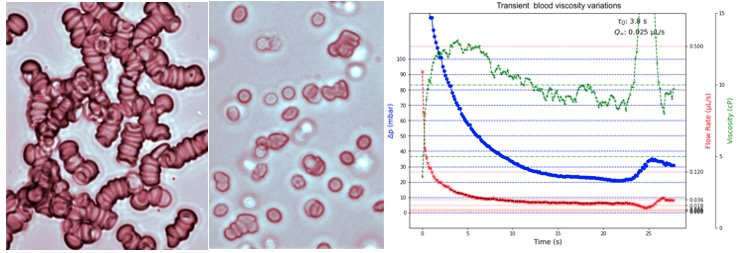Internship offer
- Share
- Share on Facebook
- Share on X
- Share on LinkedIn
Employment, Training, Research

Context
Red blood cells, which occupy on average 40 to 50% of blood volume and transport oxygen through the circulation, are simple cells composed of a deformable membrane containing a viscous hemoglobin solution. The presence of fibrinogen in blood plasma, at concentrations that vary—particularly in inflammatory states—causes red blood cells to aggregate into structures known as “rouleaux.” This aggregation, which is reversible, leads to an increase in blood viscosity at low flow velocities or stresses and is therefore responsible for the shear-thinning behavior of blood.
Although this effect appears significant only at hydrodynamic stresses much lower than those typically encountered in normal macroscopic circulation, certain circulatory conditions can create quasi-stagnant zones where aggregation may have a notable impact on blood rheology. This is particularly the case in some pathological situations with disturbed flow (e.g., stenoses) or in astronauts during spaceflight. The kinetics of red blood cell aggregate formation and breakage, along with the associated changes in viscosity under these conditions, are therefore of crucial importance.
This study is part of a project supported by CNES and ESA.
Objectives and methodology
The internship will focus on characterizing the effective viscosity of red blood cell suspensions undergoing aggregation in channel flows, using flow–pressure measurements alongside conventional rheometric techniques. To correlate rheological changes with suspension structure and aggregation, optical characterization methods will be coupled to these measurements, including microscopy observations and light scattering experiments.
On the technical side, the work will include sample preparation, microfluidic setup assembly, experiment setup and execution (flow control, image acquisition), and image and data processing.
Candidate profile
We are looking for a second-year (or possibly first-year) Master’s student or engineering student in mechanics, physics, or bioengineering, who is curious, dynamic, and interested in experimentation, microfluidics, and data and image analysis. Experience in programming (Python) is a plus.
Download
Internship offer (PDF, 801.88 KB)
Contact
thomas.podgorski univ-grenoble-alpes.fr (thomas[dot]podgorski[at]univ-grenoble-alpes[dot]fr)
univ-grenoble-alpes.fr (thomas[dot]podgorski[at]univ-grenoble-alpes[dot]fr)
Research topic "Blood flow and rheology"
- Share
- Share on Facebook
- Share on X
- Share on LinkedIn